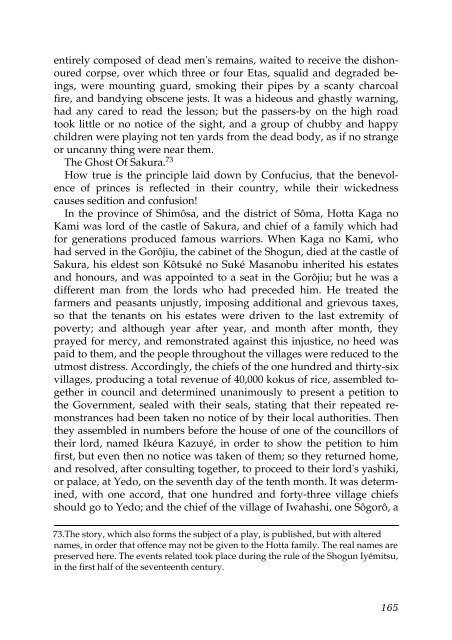You also want an ePaper? Increase the reach of your titles
YUMPU automatically turns print PDFs into web optimized ePapers that Google loves.
entirely composed <strong>of</strong> dead men's remains, waited to receive the dishonoured<br />
corpse, over which three or four Etas, squalid and degraded beings,<br />
were mounting guard, smoking their pipes by a scanty charcoal<br />
fire, and bandying obscene jests. <strong>It</strong> was a hideous and ghastly warning,<br />
had any cared to read the lesson; but the passers-by on the high road<br />
took little or no notice <strong>of</strong> the sight, and a group <strong>of</strong> chubby and happy<br />
children were playing not ten yards from the dead body, as if no strange<br />
or uncanny thing were near them.<br />
The Ghost Of Sakura. 73<br />
How true is the principle laid down by Confucius, that the benevolence<br />
<strong>of</strong> princes is reflected in their country, while their wickedness<br />
causes sedition and confusion!<br />
In the province <strong>of</strong> Shimôsa, and the district <strong>of</strong> Sôma, Hotta Kaga no<br />
Kami was lord <strong>of</strong> the castle <strong>of</strong> Sakura, and chief <strong>of</strong> a family which had<br />
for generations produced famous warriors. When Kaga no Kami, who<br />
had served in the Gorôjiu, the cabinet <strong>of</strong> the Shogun, died at the castle <strong>of</strong><br />
Sakura, his eldest son Kôtsuké no Suké Masanobu inherited his estates<br />
and honours, and was appointed to a seat in the Gorôjiu; but he was a<br />
different man from the lords who had preceded him. He treated the<br />
farmers and peasants unjustly, imposing additional and grievous taxes,<br />
so that the tenants on his estates were driven to the last extremity <strong>of</strong><br />
poverty; and although year after year, and month after month, they<br />
prayed for mercy, and remonstrated against this injustice, no heed was<br />
paid to them, and the people throughout the villages were reduced to the<br />
utmost distress. Accordingly, the chiefs <strong>of</strong> the one hundred and thirty-six<br />
villages, producing a total revenue <strong>of</strong> 40,000 kokus <strong>of</strong> rice, assembled together<br />
in council and determined unanimously to present a petition to<br />
the Government, sealed with their seals, stating that their repeated remonstrances<br />
had been taken no notice <strong>of</strong> by their local authorities. Then<br />
they assembled in numbers before the house <strong>of</strong> one <strong>of</strong> the councillors <strong>of</strong><br />
their lord, named Ikéura Kazuyé, in order to show the petition to him<br />
first, but even then no notice was taken <strong>of</strong> them; so they returned home,<br />
and resolved, after consulting together, to proceed to their lord's yashiki,<br />
or palace, at Yedo, on the seventh day <strong>of</strong> the tenth month. <strong>It</strong> was determined,<br />
with one accord, that one hundred and forty-three village chiefs<br />
should go to Yedo; and the chief <strong>of</strong> the village <strong>of</strong> Iwahashi, one Sôgorô, a<br />
73.The story, which also forms the subject <strong>of</strong> a play, is published, but with altered<br />
names, in order that <strong>of</strong>fence may not be given to the Hotta family. The real names are<br />
preserved here. The events related took place during the rule <strong>of</strong> the Shogun Iyémitsu,<br />
in the first half <strong>of</strong> the seventeenth century.<br />
165



